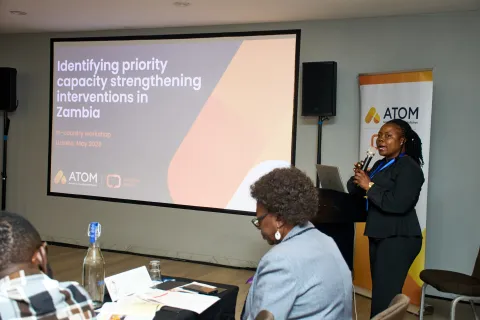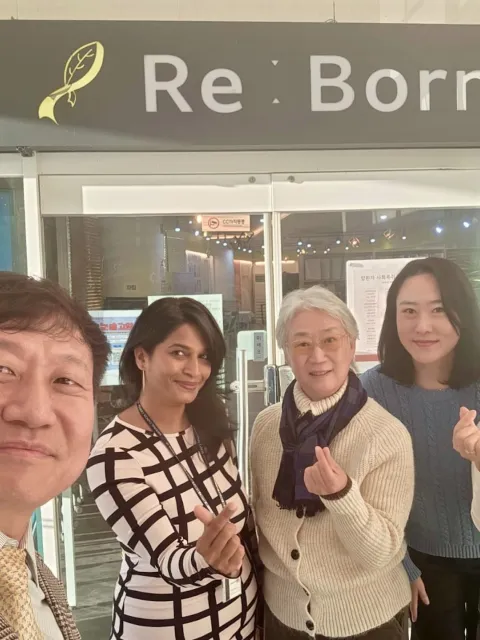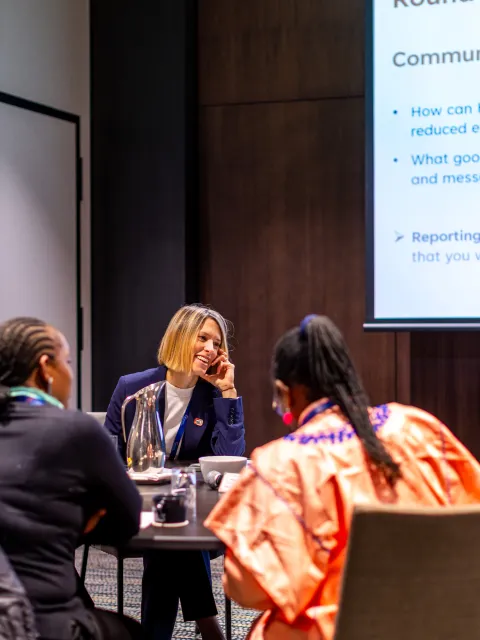Supporting national efforts to strengthen access to cancer treatment in Zambia
ATOM Coalition representatives met with key stakeholders in Lusaka, Zambia on 6-7 May to identify national priorities for improving access to essential and innovative cancer medicines. The organisation marks this month three years since it was launched in 2022 at the World Health Assembly in Geneva.

ATOM Coalition representatives met with stakeholders in Zambia to define priority target interventions to improve access to cancer medicines and diagnostics and strengthen the country’s oncology care systems. Photo by Eness Photography | © UICC 2025
HIGHLIGHTS
- The ATOM Coalition, in collaboration with the Zambian Ministry of Health and the Zambian Cancer Society, held a workshop in Lusaka on 6-7 May to identify priority interventions for improving access to cancer treatment in Zambia.
- The workshop aimed to validate the findings of an in-depth assessment of Zambia's medicines landscape and establish consensus on priority areas such as regulatory affairs, supply systems, diagnostics, and clinical use.
- The findings from the assessment will be shared with Coalition partners during a webinar in July, forming the basis for tailored interventions and strategic access models to enhance Zambia's health system's capacity to receive and use cancer medicines and diagnostics.
The ATOM Coalition, in close collaboration with the Zambian Ministry of Health (MOH) and the Zambian Cancer Society, convened a workshop in Lusaka on 6–7 May to identify priority target interventions to improve access to cancer treatment.
The workshop brought together a multidisciplinary group of cancer care stakeholders nominated by the MOH, including senior officials such as Dr Citonje Msadabwe, Superintendent of the Cancer Diseases Hospital, and representatives of the Zambian Regulatory Agency (ZAMRA) and Zambia Medicines and Medical Supplies Agency (ZAMMSA).
The purpose of the workshop was to validate the findings of an in-depth assessment of Zambia’s medicines landscape, and to establish group consensus on priority areas to address under regulatory affairs, supply systems, diagnostics, and clinical use. The assessment was conducted in collaboration with local consulting firm Med-RAP (Medicines Research and Access Platform).
The findings from this assessment will be shared with ATOM Coalition partners during a webinar in July. This webinar will serve as the foundation for developing tailored interventions and specific programmes and strategies to strengthen Zambia’s health system, enabling it to better receive and effectively use cancer medicines and diagnostic tools.
This workshop marks a key step in ATOM’s mission to support countries in removing systemic barriers to accessing cancer treatment. By facilitating national ownership and drawing on the expertise of its global network, the ATOM Coalition aims to help Zambia and other partner countries deliver high-quality cancer care to more people, regardless of income or geography.
Last update
Friday 29 August 2025
